December 20, 2008
The Hollywood Immortals Who were Made by Blood
Flynn, De Havilland, Korngold
Errol Flynn: His sword carved his name across the continents – and his glory across the seas!
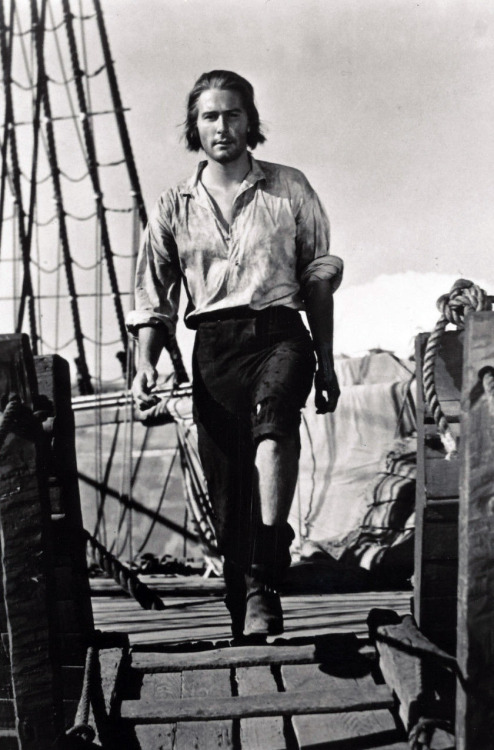
Flynn had only moderate acting experience. His roles in the four films he made since 1933 were small and somewhat unimpressive. Who remembers him as Fletcher Christian, for example. But he improved so rapidly in Blood that many early scenes were reshot. In fact, he ends up being quite good on screen, giving the impression of understanding his role, approaching his part, maybe, with the care of a Shakespearean actor. It’s a common appraisal but true: besides being able to flourish a sword better than anyone before or since, Flynn wore period clothes with style, as if he had stepped out of the past, or, as some have said, belonged there.
He spoke the convoluted lines naturally and with conviction. Not easy. The stilted quaintness and archaisms of the dialogue are largely retained from Rafael Sabatini’s 1922 novel, thanks to Casey Robinson’s screenplay. Yes, the words have a certain fascination because they are so quaint, so different from normal usage and seem to fit imagined 17th-century speech: “Faith, yes, I don’t doubt it. You’ve the looks and manners of a hangman.” “It’s entirely innocent I am.” “Bedad, we’ll have a crew yet!” “ … while I, who hate this pestilential island—well, such are the quirks of circumstance.” —All lines delivered by Flynn!
Olivia de Havilland: Her talent, beauty and charisma were resplendent
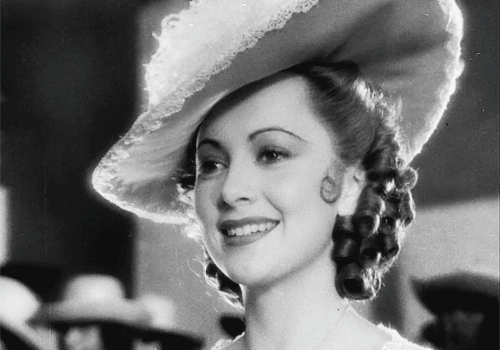
As for Olivia de Havilland, who had made only one previous film, A Midsummer Night’s Dream earlier that year, Blood offered a much larger role. Her girlish and virginal persona would endure essentially unchanged in the seven subsequent films she made with Flynn, and the two would become one of Hollywood’s great romantic screen couples, á la Tracy and Hepburn, Bogart and Bacall. The charisma between the two, immediately evident in Blood, persists resplendently in all their films.
Erich Korngold: His film scoring changed everything
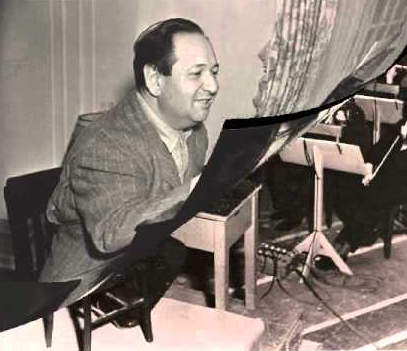
A Viennese composer of operas and chamber music, once a child prodigy, Korngold had worked with de Havilland on the Shakespeare movie arranging Mendelssohn’s music. Warner Bros. was so impressed they asked him to write an original score for a “little” movie they had just finished. Korngold, without seeing Blood, said no, but after WB’s insistence and a private screening, he was so moved by the film’s charm and humor* that he agreed to write the music.
The humor that so impressed Korngold runs throughout the film. A recurring joke is Governor Steed’s (George Hassell) bout with the gout. Following a slave branding, the next shot shows the governor in a close-up. “What a cruel shame,” he says, “that any man is made to suffer so.”
What Korngold didn’t know—what WB had failed to tell him—was that he had only three weeks.
With time running out, he borrowed parts of two Franz Liszt tone poems, Mazeppa and Prometheus, to support the noisy battle scenes, interspersed with previous Korngold music from the film. While movie composers today appropriate the classics as their own, usually without acknowledgment, Korngold insisted his main title credit read “Arrangements by Erich Wolfgang Korngold.” This automatically disqualified Blood for nomination as Best Score, which it surely would have received; the composer would win the next year for Anthony Adverse.
Korngold had a large part—a very large part—in the overwhelming success of Captain Blood. A contemporary equivalent would be John Williams’ impact with Jaws (1975) or, even more so, the first of the Star Wars films (1977), which, in fact, is an obvious homage to the Korngoldian style—the lyrical, richly orchestrated, heart-on-sleeve ardor of 19th-century music.
Audiences who first heard Blood were astounded. They had never heard such music, not even compared with Max Steiner’s ground breaking King Kong (1933). The orchestra which recorded the music to film, the studio heads who saw the completed movie before release and the public which attended the country’s theaters—none of them had ever heard such music from a motion picture—a large orchestra by studio standards, complicated orchestration, big, luscious sound, dramatic music that perfectly underpinned the screen. Blood remains a milestone in film scoring, and Korngold would contribute to six more Flynn films.
Blood and his crew setting sail from Port Royal is one of the most lingering images in the film. He and Arabella exchange forlorn glances, he from the ship, she from shore, captured in multiple dissolves and supported by Korngold’s swelling music, horns echoing at the conclusion. (The scene, by the way, is replicated in The Sea Hawk [1940], Korngold and Flynn in tandem, only with Brenda Marshall as a pale stand-in for Olivia.) Later, before the final sea battle, when Arabella is put ashore in a longboat, there’s a reprise of that first separation, the two again staring after each other, if not to swelling, then certainly to lushly romantic music—horns again prominent.
Most critics say that as early as Anthony Adverse and The Adventures of Robin Hood (1938) Korngold began experimenting with pitching the key of the music just beneath the actors’ voices. It began, actually, with Blood, if not sooner. Perhaps the best example, in any of his film scores, of how he unifies music with the screen image is the pillory scene between Blood and Jeremy Pitt (Ross Alexander), how the music—the second theme—changes in ambience, orchestration and volume, according to the emotions of the two men. Likewise, in the final love scene (“Whom else would I love?” Arabella asks), the music hesitates, softens, speeds up, becomes richer or changes in instrumentation, even disappears at one point, based on the tempo and emotion of the dialogue.
Thank you, Maestro Korngold, for this and all the your magnificent film scores. Your reward: The new career that save your life and the lives of your family.
.
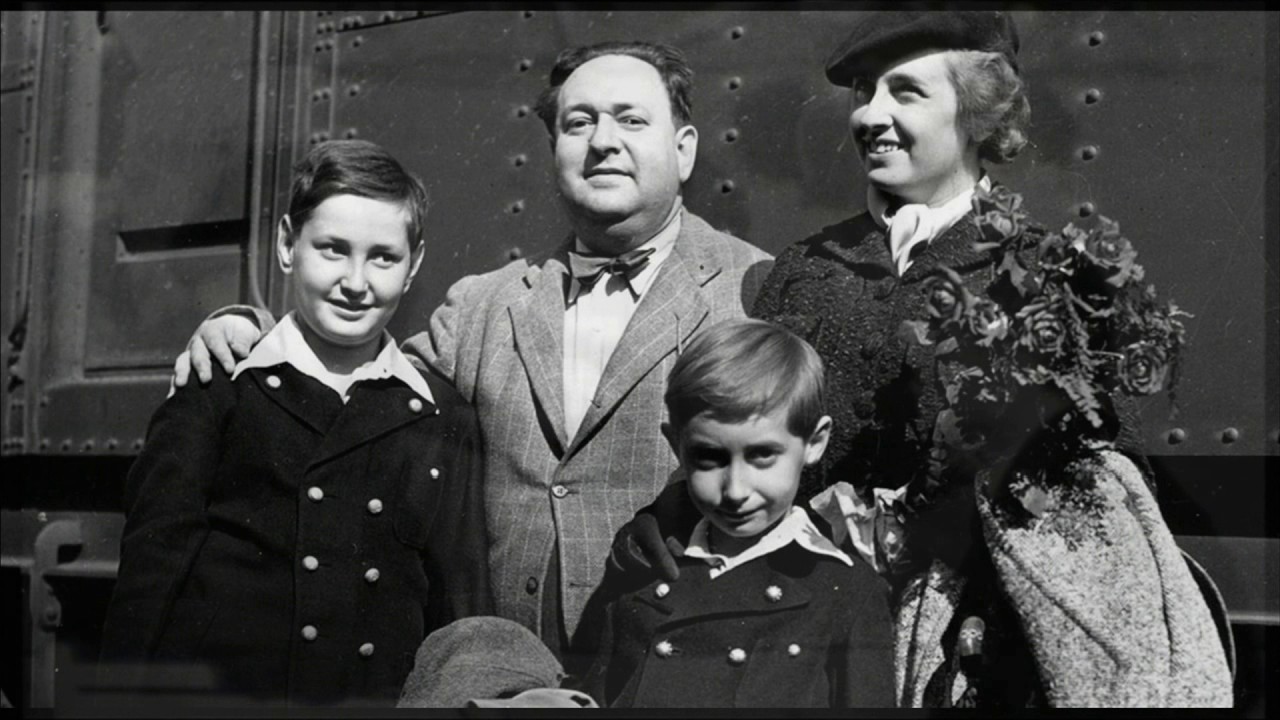
And thank you, Errolivia, for the greatest swashbuckler and for being the most romantic co-stars in the history of Hollywood. Your reward: This kiss:
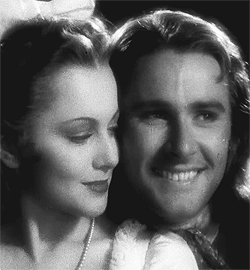
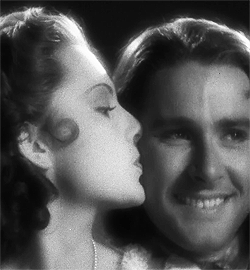
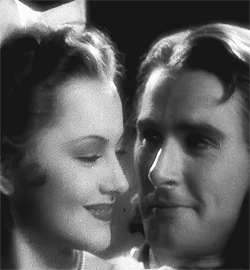
— Tim

Indeed, Lord Tim… what a gem and what a… find of an article!
ErrOlivia… the QUINTESSENTIAL COUPLE, and Korngold, MOZART… OF THE MOVIES!
Thanks, Karl. A wonderfully informative and insightful article it is.
Errol and Olivia were tailor-made for their roles.
images.app.goo.gl/ruU4CGZi6FmUVBj6A… [/img]
[/img]
…
[img
And, yes, Korngold, pure genius – Mozart of the Movies! — With Beethoven’s first name for his middle name!
A terrific find, Tim, thank you! I agree with the comment about the 99-minute version versus the original two hours. While I love having the movie as it originally was produced, it really loses very little in the shorter version and is tighter. I believe that the edited footage first reappeared back in the day when Ted Turner was colorizing the WB classics, and that footage showed up in the colorized videocassette. I remember the first time I watched it and was stunned that the 20 minutes were included. The video of The Sea Hawk also added several minutes that had been cut after its initial release. As much as I disliked colorizing those movies, I do appreciate that that footage reappeared.